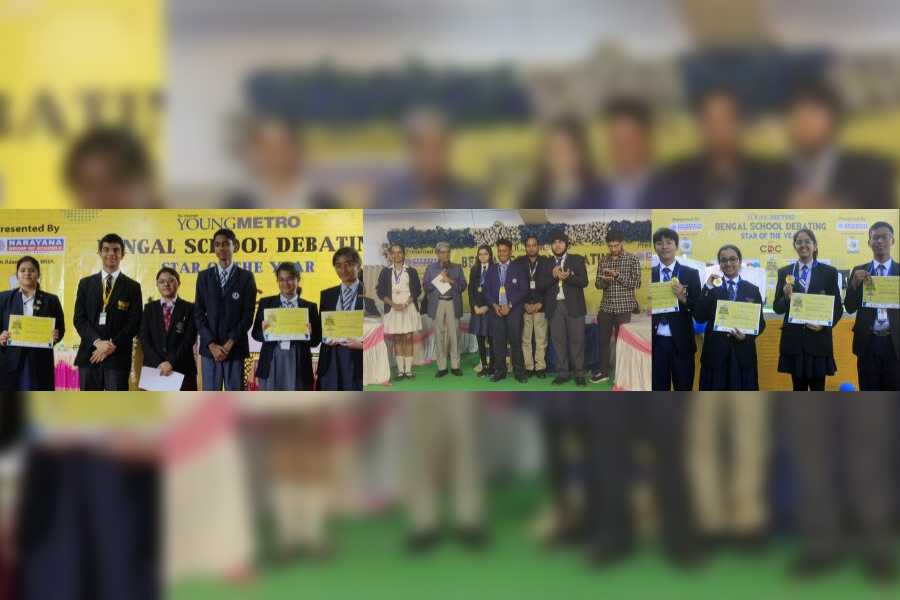English or vernacular? Students take a stand


What should come first, the language of our hearts or the language of the Internet? Can language be an identity as well as an imposition?
Sixteen students from various schools in the city made fierce arguments for and against vernacular languages at a semi-final round of The Telegraph Young Metro presents Bengal School Debating Star of the Year in collaboration with the Calcutta Debating Circle (CDC). The title sponsor of the event was Narayana Group of Schools and the Calcutta semi-final was held in the institute's New Town branch on December 5. The motion was — Vernacular Languages Should Be Prioritised over English in Schools.
Organised in association with MCKV, the first edition of Bengal School Debating Star of the Year aimed to discover more debating talents from the state. The participants for the semi-finals were selected from over 500 entrees covering three zones.
Moderated by Dr Sandeep Chatterjee, a trustee of the CDC, the Calcutta zone debate had students arguing both in English and Bengali.
Sheersha Banerjee of Class XI from Garden High School opened the proposition by citing the example of poet-playwright Michael Madhusudan Dutt, who initially had dabbled in English only to return to his mother tongue (Bengali).
"Dutt realised that he was missing out on the treasures that his mother tongue offered... The very fact we are debating this issue proves how we are neglecting vernacular languages," she said, making way to the finals.
Five others joined Sheersha in the finals. They were Zarina Mahtab of Class XI, Calcutta Girls' High School; Anusha Chowdhury of Class X and Ariv Paul of Class IX, Garden High School; Aishee Majumder of Class XI, Sushila Birla Girls' School and Nikhilesh Mukherjee of Class XI, La Martiniere for Boys.
Nikhilesh from the Opposition side brought in the issue of language imposition and personal choice.
He added how modern India has adopted English as a common language. "We are a multi-lingual nation. There will be confusion in the classroom if one vernacular is given precedence over others," he said.
Dr Kunal Sarkar, a CDC trustee, was the guest of honour at the New Town school. "The event is meant to give more students a voice," he said.
The Calcutta finalists will meet four each from North Bengal and South Bengal zones on December 8. The other two semi-finals were held simultaneously at the Siliguri and Burdwan branches of Narayana schools on December 4. The motion was the same — Today's Youth Have More Challenges Than Opportunities.
The winners of the North Bengal zone were Kinchum Lepcha and Deepnita Goswami of Class XI, Modi Public School; Saesha Agarwal of Class IX, Narayana School, Siliguri, and Rigzen Thingh of Class X, Amarpati Lions Citizens Public School, Siliguri.
The winners of the South Bengal zone were Afreena Rahman of Class X, Narayana School, Burdwan; Zeeshan Ismail of Class IX, Tamralipta Public School, Asansol; Manraj Singh of Class XI, Holy Rock School, Burdwan, and Ananya Gupta of Class IX, Loreto Convent, Asansol.
"The event is giving a lot of exposure to students. Public speaking and debates are given importance at Narayana Group of Schools," said Priyanka Mukherjee, academic head of the group of schools.